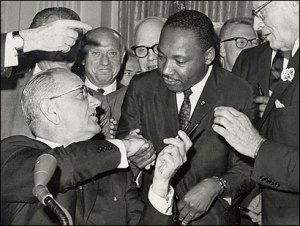 The Years of Lyndon Johnson, Robert Caro’s five-part (though the fifth has yet to be written) biography of LBJ, is an incredible chronicle of a truly complex leader, one who clearly cheated all along the way to the presidency but also showed incredible leadership in passing landmark civil rights legislation.
The Years of Lyndon Johnson, Robert Caro’s five-part (though the fifth has yet to be written) biography of LBJ, is an incredible chronicle of a truly complex leader, one who clearly cheated all along the way to the presidency but also showed incredible leadership in passing landmark civil rights legislation.
This passage from Caro’s fourth volume (The Passage of Power) shows one of LBJ’s more noble and inspiring moments, just four days after he assumed the presidency after the JFK assassination in Dallas. It says a lot about what it means to truly lead when the road is treacherous.
. . . although the cliché says that power always corrupts, what is seldom said, but what is equally true, is that power always reveals. When a man is climbing, trying to persuade others to give him power, concealment is necessary: to hide traits that might make others reluctant to give him power, to hide also what he wants to do with that power; if men recognized the traits or realized the aims, they might refuse to give him what he wants. But as a man obtains more power, camouflage is less necessary. The curtain begins to rise. The revealing begins. When Lyndon Johnson had accumulated enough power to do something — a small something — for civil rights in the Senate, he had done it, inadequate though it may have been. Now, suddenly, he had a lot more power, and it didn’t take him long to reveal at least part of what he wanted to do with it. On the evening of November 26, the advisers gathered around the dining room table in his home to draft the speech he was to deliver the following day to a joint session of Congress were arguing about the amount of emphasis to be given to civil rights in that speech, his first major address as President. As Johnson sat silently listening, most of these advisers were warning that he must not emphasize the subject because it would antagonize the southerners who controlled Congress, and whose support he would need for the rest of his presidency — and because a civil rights bill had no chance of passage anyway. And then, in the early hours of the morning, as one of those advisers recalls, “one of the wise, practical people around the table” told him to his face that a President shouldn’t spend his time and power on lost causes, no matter how worthy those causes might be.
“Well, what the hell’s the presidency for?” Lyndon Johnson replied.
The next day, Johnson went out and said to Congress, “No memorial oration or eulogy could more eloquently honor President Kennedy’s memory than the earliest possible passage of the civil rights bill for which he fought so long.” After a lot of wrangling, the Civil Rights Act was passed and enacted on July 2, 1964 — but it may never have happened or happened much later had LBJ listened to “one of the wise, practical people around the table.”
Source: Caro, Robert A. The Passage of Power (The Years of Lyndon Johnson) (Kindle Locations 194-201).
You must be logged in to post a comment.